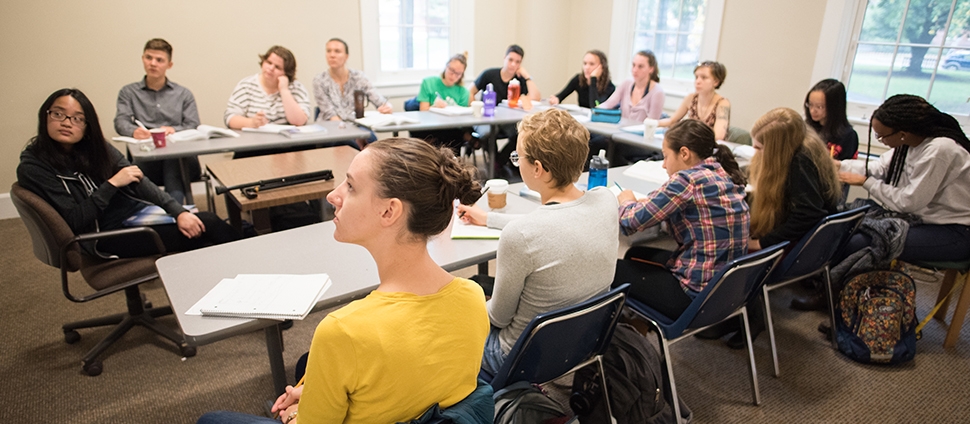Linguistics

Linguistics is the science of human language: what is common to the languages of the world and how they can best be described. The study of linguistics addresses questions concerning how languages diversify and what the connections are among them. It also asks: What do humans know when they know a language?
The minor in linguistics allows students to explore some of these questions, making it a useful complement to several majors, including a major in a language, philosophy, education, logic, psychology, computer science or anthropology.
To meet the requirements of the linguistics minor, students must take six courses in linguistics and related fields, including:
- Basis: PHI 236 Linguistic Structures (or its equivalent at the Five Colleges)
- Four linguistics-related courses (one year-long college course in a foreign language may substitute for one of these four)
- A seminar or other advanced work, to be agreed on with the adviser
To learn more about crafting a student-designed interdepartmental minor, see the class deans website.
The following curriculum is similar to proposals that have been accepted before and acknowledges the desirability of both logic (which counts toward the mathematics/analytical philosophy requirement) and another language (which counts toward the language requirement).
There has been an average of one or more linguistics majors a year for several decades. A typical self-designed linguistics major requires two sponsoring departments and advisers chosen according to the student's interests. A good guide for planning is the following*:
- One introductory course in linguistics
- One logic course
- One year of a language
- At minimum, two more core courses in linguistics (syntax, semantics, phonetics, phonology, field methods)
- Six optional courses from an array of possible courses
- At least one of these courses should be a seminar or 400-level work, or a thesis
*Depending on how the student satisfies the requirements, this will be a total of eleven or twelve courses. See this pdf for a sample proposal: SampleLinguisticsMajor
Learn more about crafting a student-designed interdepartmental major on the class deans website.
Five College Courses
It will be necessary to take courses off campus in the Five Colleges, especially at the University of Massachusetts at Amherst, which has a world-class linguistics department.
Junior Year Abroad
Students often take courses in their Junior Year Abroad that satisfy the major. Learn more on the Study Abroad website.
Classics
- CLS 150 Roots: Greek and Latin Elements in English
Comparative Literature
- CLT 220 Colloquium: Imagining Language
East Asian Languages and Literatures
- EAL 240 Japanese Language and Culture
Education
- EDC 338 Children Learning to Read
English
- ENG 207 The Technology of Reading and Writing
Italian
- ITL 340 The Theory and Practice of Translation
Logic
- LOG 100 Valid and Invalid Reasoning: What Follows From What?
- LOG 220 Intermediate Logic
Philosophy
- PHI 213 Language Acquisition
- PHI 262 Meaning and Truth: The Semantics of Natural Language
Psychology
- PSY 213 Colloquium: Language Acquisition
- PSY 214 Colloquium: Disorders of Language and Communication
- PSY 313 Seminar in Psycholinguistics
For more information on courses, please see the Smith College Course Catalog.
Faculty
Contact
401 Bass Hall
Smith College
Northampton, MA 01063
For questions regarding the linguistics minor at Smith College, please contact the director of the minor, Jill de Villiers.
Individual appointments can be arranged directly with the faculty.











